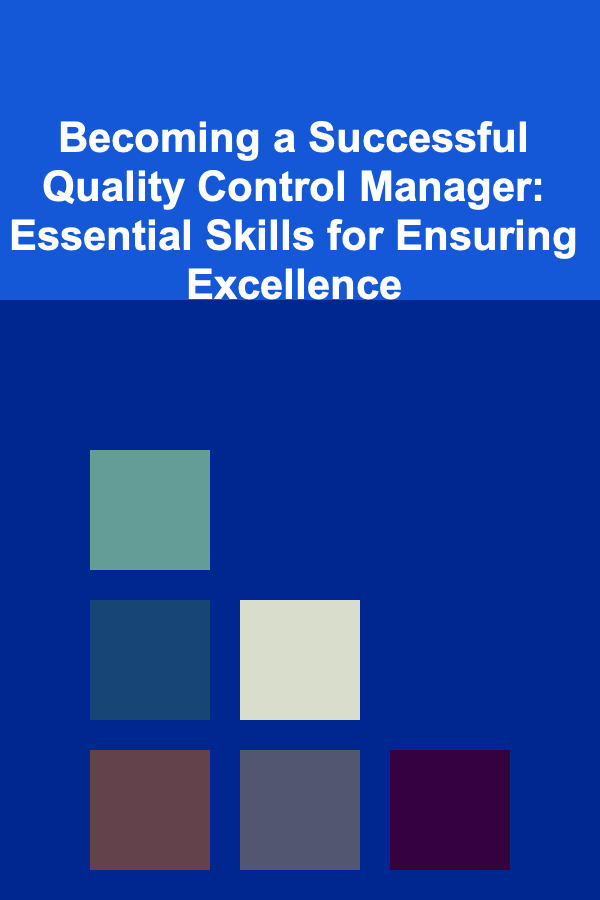
Becoming a Successful Quality Control Manager: Essential Skills for Ensuring Excellence
ebook include PDF & Audio bundle (Micro Guide)
$12.99$8.99
Limited Time Offer! Order within the next:

Quality Control (QC) is a pivotal function in any industry that involves the production of goods or services. Whether in manufacturing, pharmaceuticals, food production, or software development, ensuring the quality of the final product is critical for customer satisfaction, brand reputation, and regulatory compliance. As a Quality Control Manager, the responsibility of ensuring these outcomes falls squarely on your shoulders.
To be effective in this role, a QC Manager must develop and hone a variety of skills, both technical and interpersonal. In this article, we will explore the key competencies that contribute to the success of a QC Manager and provide actionable guidance on how to develop these essential skills.
Understanding Quality Standards and Regulatory Compliance
A QC Manager's primary role is to ensure that products meet established quality standards, which include both industry-specific regulations and internal company criteria. Knowledge of these standards is fundamental to the role.
Essential Skills:
- Knowledge of Industry Regulations: Familiarity with industry regulations such as ISO 9001 (for manufacturing), FDA guidelines (for pharmaceuticals), or GMP (Good Manufacturing Practices) is crucial. QC managers need to ensure that all processes align with these standards and that products are in full compliance.
- Understanding of Quality Assurance Frameworks: Understanding frameworks like Six Sigma, Total Quality Management (TQM), or Statistical Process Control (SPC) is vital. These frameworks provide the structure for managing quality effectively and continuously improving processes.
- Ability to Interpret Standards and Guidelines: A QC Manager must interpret complex regulations and adapt them to their company's specific context. The ability to translate regulatory jargon into actionable plans is key to ensuring compliance at every stage of production.
Actionable Steps:
- Regularly review regulatory updates from bodies such as the FDA, ISO, or other relevant regulatory authorities.
- Take part in webinars, training, and certification programs to keep up-to-date with new quality standards and industry-specific guidelines.
- Develop and maintain a compliance matrix that tracks all applicable regulations for different departments within your organization.
Attention to Detail and Analytical Thinking
QC is all about identifying discrepancies and ensuring precision. Attention to detail and a sharp analytical mind are essential in catching issues before they become larger problems.
Essential Skills:
- Attention to Detail: Being able to spot minute variations or defects in products or processes is crucial. Whether it's the color, size, or functionality of a product, missing these details can result in costly mistakes.
- Root Cause Analysis: When a defect is discovered, a QC Manager must be able to trace it back to its origin. This involves analyzing data, reviewing processes, and conducting investigations to identify underlying causes.
- Critical Thinking: QC Managers need to think critically about how to improve processes, resolve issues, and ensure product quality. This requires making decisions based on facts, historical data, and predictive analysis.
Actionable Steps:
- Conduct regular training on the importance of attention to detail, focusing on scenarios where small errors have had significant consequences.
- Develop and implement a structured problem-solving process for root cause analysis, using techniques like the "5 Whys" or Fishbone Diagram to identify the origin of defects.
- Use data analytics tools to monitor trends and identify areas where processes could be improved. This could involve using software for Statistical Process Control or implementing predictive models based on historical performance data.
Leadership and Communication Skills
A successful QC Manager must be an effective leader, able to guide a team, communicate quality standards, and manage the implementation of QC processes across various departments. Leadership in QC goes beyond just managing a team---it involves influencing others to adopt best practices and maintaining a culture of quality.
Essential Skills:
- Leadership and Team Management: You'll often be tasked with managing QC inspectors, analysts, and technicians. Motivating and leading them effectively requires excellent people management skills. Being able to delegate tasks appropriately, encourage team collaboration, and resolve conflicts will ensure smooth operations.
- Effective Communication: Clear communication is key to conveying quality expectations, procedures, and feedback to team members, production staff, and upper management. This includes both verbal and written communication, such as drafting reports, explaining issues, or conducting meetings.
- Training and Development: As a QC Manager, you will be responsible for training and upskilling employees in quality standards, testing procedures, and compliance. Providing regular educational sessions will ensure that the team remains knowledgeable and up-to-date with best practices.
Actionable Steps:
- Invest time in improving your leadership skills by attending workshops or reading books on team management and leadership.
- Hold regular team meetings to communicate QC priorities, share insights on quality metrics, and discuss challenges. This helps keep everyone aligned with the company's quality goals.
- Develop a mentorship program for junior QC team members, providing them with opportunities for learning and development.
Proficiency with Quality Control Tools and Technology
Modern QC relies heavily on technology and specialized tools to enhance accuracy, speed, and efficiency. A QC Manager must be proficient in a range of quality control tools and software that streamline testing, inspection, and analysis.
Essential Skills:
- Understanding QC Software and Automation Tools: Familiarity with software that automates inspections, tracks defects, and generates reports is becoming more essential. QC Managers should be proficient in using tools like ERP systems, Statistical Process Control software, and defect-tracking platforms.
- Instrument Calibration and Testing Equipment: QC Managers should have a solid understanding of the tools used to measure and test products. This could include mechanical testing equipment, gauges, and automated testing devices. Regular calibration and maintenance of equipment are essential for ensuring accuracy.
- Data Analysis and Reporting: The ability to analyze large sets of data is crucial in identifying quality trends and making decisions based on quantitative evidence. Tools such as Excel, Minitab, or R can be invaluable for data analysis.
Actionable Steps:
- Stay updated on the latest QC technology trends, such as AI-powered inspection systems or cloud-based quality management solutions.
- Provide training on the use of digital tools for QC tasks like data entry, defect tracking, and reporting. Familiarize yourself and your team with quality management software.
- Ensure regular maintenance and calibration of testing equipment to maintain accuracy and reliability in results.
Problem-Solving and Decision-Making Skills
QC often requires quick thinking and effective problem-solving. Whether it's dealing with a defective batch or an unexpected regulatory change, a QC Manager must act decisively to resolve issues efficiently.
Essential Skills:
- Problem-Solving: QC Managers must be able to identify the root cause of quality issues and develop effective solutions. This requires both creativity and critical thinking.
- Decision-Making: In high-pressure situations, a QC Manager must make informed decisions that align with company goals and regulatory requirements. This might include whether to halt production, implement corrective actions, or make adjustments to the QC process.
Actionable Steps:
- Create a decision-making framework for your team to follow, ensuring consistency in problem resolution.
- Develop contingency plans for dealing with common quality issues, such as defective materials, machine malfunctions, or supply chain disruptions.
- Regularly review the outcomes of past decisions to learn from mistakes and improve future decision-making processes.
Continuous Improvement Mindset
Quality control is not a static field. The most successful QC Managers adopt a mindset of continuous improvement. They constantly look for ways to enhance processes, reduce waste, and increase efficiency, all while maintaining high standards of quality.
Essential Skills:
- Process Optimization: Understanding how to streamline operations and eliminate inefficiencies without compromising product quality is vital. Familiarity with techniques like Lean Manufacturing and Six Sigma can be particularly helpful.
- Innovation: Continuously exploring new tools, techniques, or technologies to improve the quality control process will keep your operations competitive and up-to-date.
- Feedback Culture: Encouraging a culture where employees feel comfortable offering feedback about the quality process is crucial for long-term success. The best QC Managers continuously refine practices based on team input.
Actionable Steps:
- Implement regular reviews of QC processes to identify areas for improvement. This could include internal audits, process mapping, or feedback surveys from staff.
- Encourage and reward employees for suggesting process improvements or innovative ideas.
- Invest in continuous learning for yourself and your team, keeping everyone informed of new best practices, tools, and methodologies.
Conclusion
Becoming a successful Quality Control Manager is not just about overseeing inspections or ensuring compliance---it's about fostering a culture of quality, continuously improving processes, and leading a team toward excellence. The skills discussed in this guide are fundamental to excelling in this role. By developing expertise in regulatory compliance, leadership, problem-solving, data analysis, and continuous improvement, you can ensure that your organization consistently delivers products that meet the highest standards of quality.
Reading More From Our Other Websites
- [Home Party Planning 101] How to Plan the Ultimate Dinner Party at Home
- [Personal Care Tips 101] How to Boost Your Confidence with Smooth, Exfoliated Skin
- [Home Lighting 101] How to Choose the Best Task Lighting for Your Home Office Productivity
- [Hiking with Kids Tip 101] Adventure Safely: How to Teach Children the Golden Rules of Hiking
- [Personal Care Tips 101] How to Create a Sensory-Friendly Personal Care Routine for Sensitive Individuals
- [Organization Tip 101] How to Create a Mudroom Area in Your Garage
- [Simple Life Tip 101] How to Transition to a Low‑Maintenance Indoor Plant Collection for Busy Lives
- [Personal Care Tips 101] How to Maintain Healthy Scalp and Hair with Dry Shampoo
- [Trail Running Tip 101] Innovations in Trail Running Fabrics: What's New and Why It Matters
- [Screen Printing Tip 101] Best Maintenance Routines to Extend the Life of Screens and Frames in Print Shops

How to Make Money Online as an Optometrist: 10 Actionable Ideas
Read More
How to Make Your Home Feel Luxurious with Budget-Friendly Updates
Read More
How to Secure Your Home While Traveling
Read More
How to Train Your Pet to Behave Inside the Home
Read More
How to Choose a Secure Blockchain Wallet
Read More
Mastering Time Management for Freelancers: A Comprehensive Guide
Read MoreOther Products

How to Make Money Online as an Optometrist: 10 Actionable Ideas
Read More
How to Make Your Home Feel Luxurious with Budget-Friendly Updates
Read More
How to Secure Your Home While Traveling
Read More
How to Train Your Pet to Behave Inside the Home
Read More
How to Choose a Secure Blockchain Wallet
Read More